Elections
Latest

Nearly half of the votes in Estonia's election were cast online
While many parts of the world are still struggling with voting machines, Estonia appears to be embracing online voting with gusto. In the country's recently finished parliamentary elections, nearly 44 percent of votes were cast through the i-voting system -- a major milestone when just 16 percent of Estonians voted online in 2009's EU elections. The result isn't a total surprise when the nation has spent most of the past two decades digitizing government functions, but it's still no mean feat given everything involved.

Google Canada will ban political ads before this year's elections
Google will ban all political ads in Canada ahead of the country's federal election this year, the company told The Globe and Mail. Back in December, the Canadian government passed a bill that would require online platforms to keep a record of all the political and partisan ads they publish directly or indirectly during election season. Google asked officials to amend parts of the bill before it passed, warning them that they would be too difficult to comply with.

Microsoft: Russian hackers are trying to influence EU elections
The European Elections come at a crucial time for the world, since their outcome could ultimately dictate if peace in Europe can be maintained. That explains why the number of attempts to undermine the process by a hostile nation state (with a name that rhymes with blusher) is intensifying. Microsoft has revealed that it's not just political campaigns that have come under fire, but the broader pillars of the political process.

UK parliament report will call for 'sweeping' regulation of Facebook
The UK Parliament's Facebook document dump is close to creating serious legal trouble for the social network. According to The Guardian, the Digital, Culture, Media and Sport Committee plans to release a report on February 18th calling on the UK government to enact "sweeping" legislation regulating Facebook's activities. The findings will assert that Facebook can't be trusted to police its own data handling, and that CEO Mark Zuckerberg has been "duplicitous."

DOJ report finds foreign meddling had no impact on midterm elections
If attempts at election meddling had any tangible effect on the US midterms, you won't hear about it from some officials. The Departments of Justice and Homeland Security have submitted a joint report to President Trump saying there was no evidence a foreign government or agency had a "material impact" on the infrastructures of the 2018 vote, including campaigns and political bodies. The actual conclusions are classified, but they're consistent with what the government said after the elections, the Justice Department said.

Canada doesn't trust social networks to warn of election interference
Social networks like Facebook and Twitter have set up war rooms and disclosure systems to warn of potential election meddling, but the Canadian government doesn't believe that's good enough. The country's Democratic Institutions Minister has established a panel of five politicians that will warn the public when there's evidence of attempted interference during election periods, including the upcoming October federal election. If they believe there's a threat, they'll not only alert the Prime Minister, party officials and Elections Canada, they'll hold a press conference to reveal the details to everyone.
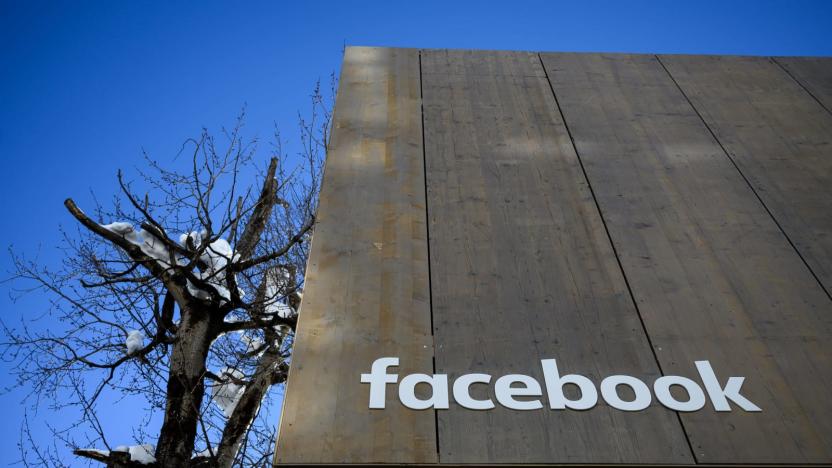
Facebook expands election integrity efforts ahead of EU vote
European Parliament elections are set to take place in May, which of course means there are bad actors who will try to use nefarious means to disrupt the process. Facebook is trying to clamp down on interference on its platforms, with measures including new rules for electoral ads and those related to key election issues. Advertisers need to confirm their identities before they can post ads, while Facebook plans to increase transparency around such ads (an effort with which it has faced some difficulties).

2018 in cybersecurity: Regrets, we have a few
This was the year security slips, privacy fails and outright stupidity went from bad to surreal. It was a year in which warnings went unheeded and companies lost whatever trust we gave them. It was a nesting doll of security disasters. A clown car of willful negligence. A long 12 months of totally unsexy, nonconsensual edge-play with our data.
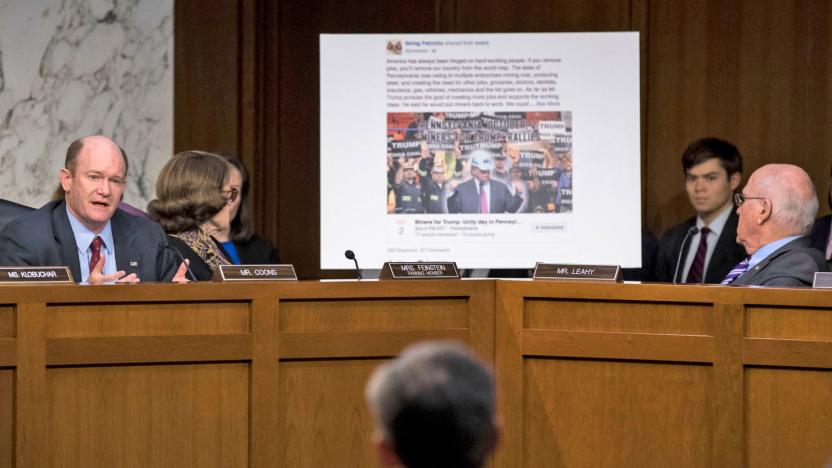
Senate report details Russia's online meddling in 2016 election
The US Senate is about to receive a report detailing Russia's online manipulation attempts during and after the 2016 Presidential election, and it promises to shed new light on the subject... including a lack of evidence from the internet giants themselves. The research, conducted by both Oxford University and network analysis company Graphika, outlines some familiar strategies. The Russians "clearly sought to benefit" the Republicans, rallying support for Trump on social networks while trying to "confuse, distract and ultimately discourage" Trump's opponents. It also notes that Russia's digital influence plans started with Twitter, but quickly expanded to Instagram and YouTube -- Facebook actually came last. They also tried smaller social networks like Google+, Pinterest and Tumblr (owned by Engadget parent company Verizon) as well as email.
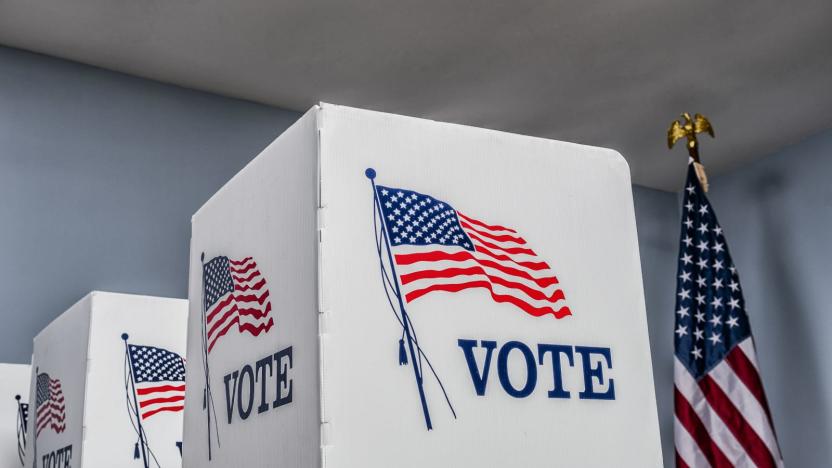
Amazon prepares Alexa for the midterm elections
Amazon knows you'll ask Alexa all sorts of questions about the midterms and politics in general, so it's been preparing the voice assistant for the event. It has teamed up with nonprofit digital encyclopedia Ballotpedia to equip Alexa with answers first-time voters will find especially helpful. You can ask the assistant when the polls will open and what's on your ballot. Alexa can even answer what it means to vote yes or no for a certain ballot measure and can list nominees running for a specific position.

Recommended Reading: Midterms have already been hacked
The midterms are already hacked. You just don't know it yet. Benjamin Wofford, Vox The concerns regarding voting processes in the US are nothing new, especially when it comes to vulnerabilities. Vox is the latest to take an in-depth look at the troubling issues surrounding voting systems ahead of the midterms on November 6th. And it's (still) not pretty, even after months of warnings from all sides.

US targets individual Russians in fight against election interference
The US isn't limited to fighting election interference campaigns on its own soil. The New York Times has learned that Cyber Command is conducting the country's first known overseas operation to protect American voting against online meddling. The initiative reportedly entails deterring individual Russian operatives spreading disinformation by making it clear that US agents are tracking their activity. In theory, this will force the Russians to change their behavior without prompting an escalation that could lead to power grid attacks and other much more serious campaigns.

Inside Facebook's 'war room' is a battle for public trust
The internet has a misinformation problem. Symptoms include fake news, election interference, hate speech, trolling -- it goes by many names. It's become increasingly clear over the past few years that social media platforms should bear some responsibility for policing what's shared on them. None more so than Facebook. For many, it's the front page of the internet. The place they go to like friends' baby pictures, watch viral videos and read the news. Facebook's doing its part to tackle misinformation, and talking about what it's doing to tackle misinformation even more. And so today, we're hearing more about the 'war room.'
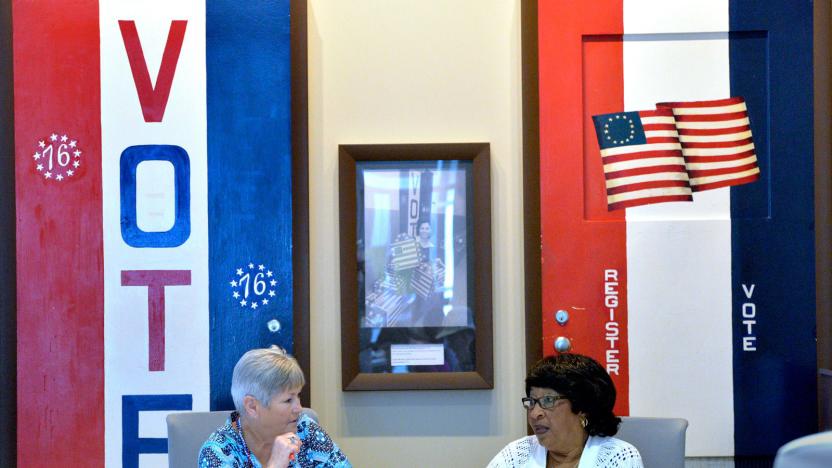
USA Today thinks chat bots can keep voters informed during midterms
USA Today is no stranger to using technology as a hook for political coverage, but this time it could be particularly helpful in performing your civic duty. It's rolling out chat bots across its properties that will help you keep tabs on various aspects of the 2018 midterm elections, including national news, regional election info and the hot-button issues of the day. And crucially, the bots will help you find polling stations -- you'll know both where local politicians stand as well as where to vote on November 6th.

Facebook is banning misinformation about voting ahead of the midterms
Partisan fraudsters may have a tougher time disseminating misinformation to voters over the next 22 days, as Facebook has vowed to crack down the spread of such "fake news" ahead of November's midterm elections, Reuters reports.

Facebook says recent data breach wasn't 'related to the midterms'
Even though the number of users affected by Facebook's most recent hack was lowered to 29 million, from 50 million, it's still safe to say the attack was worse than originally thought. That's because we now know that the breach, which Facebook revealed a couple of weeks ago, exposed very detailed information of 14 million of those users, including their username, birthdate, gender, location, relationship status, religion, hometown, self-reported current city, education, work, the devices they used to access Facebook and the last 10 places they checked into (or were tagged in) on the site. The attackers, whose identities Facebook won't reveal because of an ongoing FBI investigation, were also able to view which people/Pages were followed by these 14 million users, as well as their 15 most recent searches on Facebook.

Twitter touts its recent work to 'protect the integrity of elections'
It's almost the midterm elections in the US, and that means disinformation campaigns could be working overtime. Social networks have been introducing new features, rolling out changes and even asking the government for help to fight off trolls and fake news disseminators. Twitter, for instance, has expanded its ability to spot and remove fake accounts. In a post detailing its elections integrity work, the microblogging platform said it may now delete "fake accounts engaged in a variety of emergent, malicious behaviors."
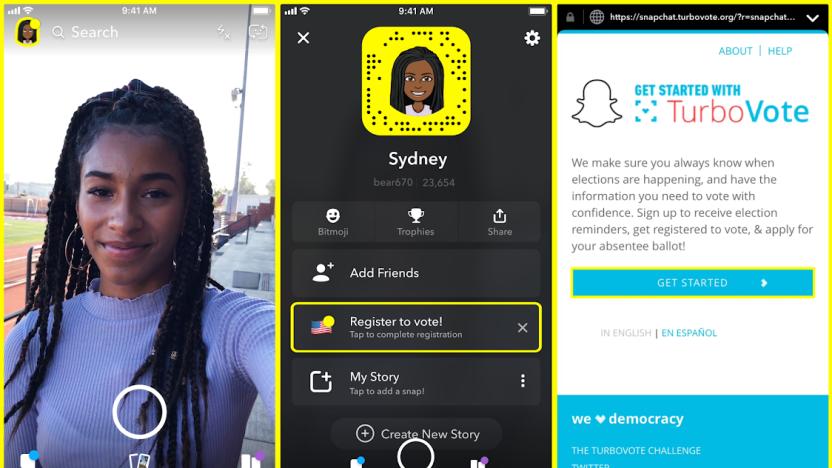
Snapchat drives voter registration inside its app
The November midterms are just weeks away, and following efforts from Instagram and Twitter to engage users in the voting process, Snapchat has now joined the fold. Starting today, all US Snapchat users aged 18+ will see a voter registration link on their user profile page. Tap it, and you'll be taken to a made-for-Snapchat TurboVote mobile site, where you can register to vote quickly and easily, as well as get all kinds of other info about the election. Team Snapchat will send a video message to all of its 18+ US users, encouraging them to sign up, and those that do get a special filter. Everything will be available in Spanish, too.

Recommended Reading: The reality of sci-fi's AI immortality obsession
Are Hosts, Replicants, and robot clones closer than we think? Jayson Greene, The Ringer Black Mirror already uncomfortably aligns with the real world, but we might be even closer to more advanced concepts from that show and others, like Westworld and Altered Carbon, becoming reality. The Ringer offers a look at just how far away we could be from Hosts, Replicants and robotic clones following a new trailer release for Keanu Reeves' long lost Replicas movie.

Facebook is building a 'war room' for the midterm elections
In a bid to protect its millions of users from further instances of foreign interference, Facebook is building a physical "war room" ahead of the upcoming US midterm elections. In an interview with NBC News, Facebook's head of civic engagement, Samidh Chakrabarti, said the company is "laser focused on getting it right" this time, after more than 126 million Americans were exposed to meddlesome posts from Russia-linked accounts during the 2016 presidential election.









